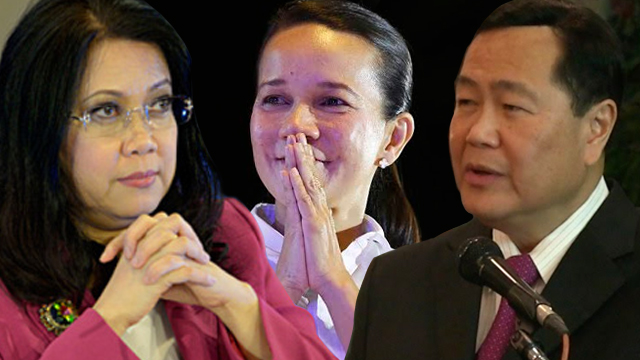
MANILA, Philippines – The main decision of the Supreme Court (SC) on the disqualification case against presidential candidate Grace Poe said there is "more than sufficient evidence that [Poe] has Filipino parents and is therefore a natural-born Filipino."
But Senior Associate Justice Antonio Carpio, who voted against Poe, said in his dissenting opinion there is no majority in the SC that holds Poe as a natural-born Filipino.
Chief Justice Maria Lourdes Sereno dismissed this in her concurring opinion released Saturday, April 9, as the court denied with finality the motions for reconsideration filed by the Commission on Elections, as well as private respondents Estrella Elamparo, Amado Valdez, Francisco "Kit" Tatad, and Antonio Contreras.
"It is offensive to the majority's pride of place that some in the minority are trying to belittle the decision by saying that since only 7 and not 8 justices declared that petitioner is natural-born Filipino, such position produces no legal effect," Sereno said in her opinion.
She added: "The reply to such position is simple: we are 7, you are 5. Seven is a majority in a group of 12. It is time that this reality be accepted. Whether such majority position will be reversed in a quo warranto petition is a future matter, but the odds against its happening are quite telling."
Citing the Constitution [Article VIII, Section 4(2) and the Court's internal rules (Rule 12, Section 1)], Sereno said a decision in the SC is formed "from the position of the majority of the justices who took part and voted on an issue."
"Since 12 justices took part – and 3 did not – on the matter of the citizenship of petitioner, it can be rightly said that a ruling has been made when a group of 7 emerged from the deliberations in favor of petitioner."
Sereno said the Court should "stay out of politics." (READ: Sereno: SC must do justice to foundlings like Poe)
"Some might say that this defense of the majority position is pre-emption of a future action. But consider what some are trying to do: nullify a constitutional provision for post-election contests on electoral qualifications, attack the majority decision to the point of calling it a mere ponencia, and transform the dissents into rallying cries against the campaign and candidacy of petitioner."
The Court this week upheld its earlier decision allowing Poe to run in the May 2016 polls. She is a front-runner in the tight presidential race to Malacañang.
Carpio's dissent
In his dissenting opinion also released on Saturday, Carpio said the Court did not put to a vote the issue of Poe's citizenship, but the justices themselves in their separate opinions made known their stand:
- Justices who said Poe is a natural-born Filipino (7): Jose Perez, Sereno, Presbitero Velasco Jr, Lucas Bersamin, Jose Mendoza, Marvic Leonen, Francis Jardeleza
- Justices who said Poe is not natural-born Filipino (5): Carpio, Teresita Leonardo-de Castro, Arturo Brion, Bienvenido Reyes, Estela Perlas-Bernabe
"Justice Del Castillo refrained from giving an opinion on the citizenship issue, invoking the Doctrine of Constitutional Avoidance, among others," Carpio noted.
"Justice Caguioa, joined by Justice Peralta, disagreed with the majority when it proceeded to rule on the question of petitioner's citizenship. According to Caguioa, 'this Court need not have made a definitive ruling on petitioner's status as a natural-born citizen.'"
Carpio's interpretation of what determines the majority is different from Sereno's.
For him, the votes of all justices who actually took part in the deliberations and voted on the issues should be counted. This means for Carpio, the votes of all 15 justices should be counted in determining the majority.
The majority, in this case, is 8 justices.
"The Chief Justice cannot validly exclude the 3 justices, who took part in the deliberations and voted on the sole issue presented for voting but had no opinion on the citizenship issue. Notably, the Chief Justice offered no justification, as there is none, for excluding the 3 justices in determining the majority."
Thus, Carpio argued, the issue of Poe's citizenship "remains hanging and unsettled." He then called the SC decision allowing Poe to run, a ruling that will "lead to an absurd result."
"The majority allows a presidential candidate with uncertain citizenship status to be elected to the Presidency. In effect, the majority wants the Court to resolve the citizenship status of a presidential candidate only after the candidate is elected. If the winning candidate is later on determined by this Court not to be a natural-born Filipino citizen, then those who voted for the winning, but later disqualified, candidate would have utterly wasted their votes."
Carpio again said it is a "mockery of the electoral process" to allow a candidate to run and be voted while his or her citizenship remains uncertain.
The minute resolution and separate opinions were released exactly a month before the May 9 polls.
Read Sereno's concurring opinion and Carpio's dissenting opinion below.
– Rappler.com

















